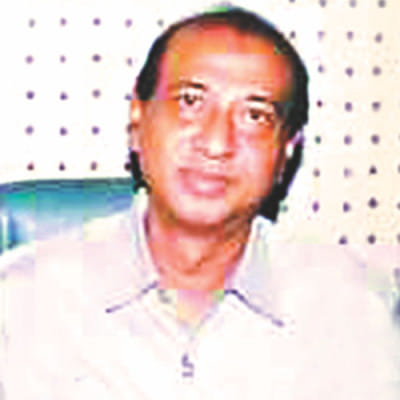A journey cut short

It's been a very long and excruciating 11 years without the presence of my father Late Humayun Kabir Balu. I was only 13 years old when he was assassinated in front of me and my two siblings. My elder brother Asif Kabir was also severely injured by the bomb attack on my father. My brother helped me know what kind of an individual my father was.
My father Humayun Kabir Balu was like the light that was forcefully blown off by some freakish wind but not before it had lit thousands of hearts. He had a charismatic personality and his fearlessness inspired many young people to take up journalism as a profession.
Even though he was always busy, he always made sure he spent time with his family. I was only 10 years old when my mother died. After the death of my mother, he did his best to be both a father and mother to us, during the last three years of his life.
Everywhere he went, I used to follow him like a shadow except when I went to school. And he was always there for me no matter how busy he was. Sometimes when my older brother, who was a student of Dhaka University, would come home during his vacations, we would spend precious moments together. We would often have family sessions, which involved all four members of the family, my father, brother, sister and me. My father wanted us to be well-educated, but more importantly, he wanted us to be good human beings, who would always be there for those in need.
January 16, 2004. The night after the assassination of Manik uncle (journalist Manik Saha, who was also killed in a bomb attack on January 15, 2004), my father was sobbing like a child on the balcony of our house. His sobs woke my brother and me and when he saw us, he took us in his arms and broke down. He kept saying, "They have killed Manik, he was just like a brother to me. I was with him five minutes before he was murdered; he was so happy about his elder daughter's success. What will happen to them now?"
But later, he turned his grief into strength. He led a protest with his fellow journalists, demanding justice for Manik Saha, disregarding the life threats he had been receiving from terrorists via phone calls and letters. He never gave up.
He also created a trust for the children of a rickshaw puller who had been killed during the attack on Manik Saha. As far as I know, the trust continues to help them with their educational expenses.
When Prime Minister Sheikh Hasina, the then opposition leader, visited Khulna Press Club soon after the murder of Manik Saha, my father told her that he was afraid that one day he too would be killed by unknown assassins and he would have to orphan his children, who had already lost their mother. His prediction proved to be true: he was killed in front of his house while getting out of his car.
Sheikh Hasina came to our house as soon as she heard the news to console us. She tried to console us and promised that she would take the responsibility of the children. Needless to say, she has kept her promise.
My father was a freedom fighter and he was the first one to fly the flag of Bangladesh in the city of Khulna, soon after the liberation of Bangladesh. He went to jail for participating in the Liberation Movement, while he was a student. Every now and then I met people telling me how they were helped by my father, and how significant his contributions were.
After coming back from school, I would often see my father sitting with a book in his hands. He was a voracious reader. He would often say to me, "Nothing will remain with you forever; not money, not any other earthly assets, except the knowledge which you will carry on forever." He would sit with me for an hour everyday to teach me things that were beyond the syllabus of any school or college; they were lessons on how to be a better human being.
A man of honour, a soul that cried for other's pain and a leader who never deserted his fellow soldiers, even though he couldn't see any sign of hope – that was my father. Eleven years passed but justice has not been served. Those involved in his murder have not been brought to book. But we are still hopeful. We don't know when justice will be served, but we know that his contributions will be cherished forever.
The writer is the youngest son of late journalist Humayun Kabir Balu, who was murdered on June 27, 2004.
Email: [email protected]

 For all latest news, follow The Daily Star's Google News channel.
For all latest news, follow The Daily Star's Google News channel. 



Comments